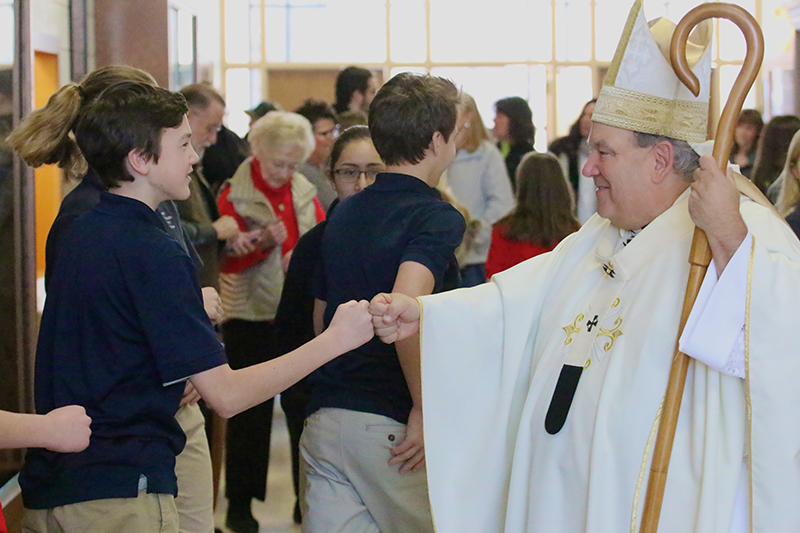Catholic Schools: Preparing Students to be ‘Lifelong Learners’
Archbishop Bernard Hebda was born in Pittsburgh, Pennsylvania, and is the oldest of four.
He attended Resurrection Elementary School in the city’s Brookline neighborhood, and South Hills Catholic High School. He went on to attend Harvard University in Massachusetts and Columbia Law School in New York. He was appointed archbishop of St. Paul and Minneapolis in March 2016. Melissa Hamilton, CSCOE’s Communications Manager, interviewed Archbishop Hebda about his Catholic school education and the impact it has had on his life.
MH: Tell us about your experience at Resurrection Elementary School.
ABH: It was a huge school, and the Sisters of Charity of Seton Hill ran the school. There were about 200 students in my class, and it was a very, very good education. The sisters were magnificent educators; they had just the right balance of firmness and kindness. I really appreciated that, and I’ve had the opportunity to stay in touch with the sisters who taught me. What always amazes me is, decades after they taught in the school, they still remember families, they are still in contact with them, and they still have such pride in the accomplishments of their students. That’s Catholic education at its best.
MH: What activities were you involved in?
ABH: In elementary school, we did just about everything. I took spelling bee, and I got to represent our school in spelling bee. The only sport we had was basketball. I loved to watch, but I was never good enough to make the team. In high school, there were a lot of activities to be involved in, like the yearbook. I was editor of the newspaper and did some theater. They had all kinds of activities at my high school, and I tried to do them all.
MH: What are your favorite memories from your school days?
ABH: I am so grateful for the friendships that I made, both in grade school and in high school. I am so grateful for the example of the sisters when I was in grade school and then the Christian Brothers when I was in high school. They always spoke to us about the importance of following in the Lord’s call. They had a deep sense of vocation. They certainly were committed to having each student, no matter where they were, develop his or her talents. I think that’s one of the things about a Catholic school that’s so amazing — there’s always a “why.” You developed these talents because God gave them to you for your happiness, but also for the good of the Church, for the good of the world. It motivates you in that way. I just certainly appreciate that my parents sacrificed to send us to Catholic schools.
I felt very well prepared when I went to high school. We were from the city parish, and the high school was in the suburbs. The kids from my grade school always did really well when they went on to high school. We knew that we had been prepared well.
The kids from my grade school always did really well when they went on to high school. We knew that we had been prepared well.
MH: How has your Catholic education prepared you for your life’s calling?
ABH: I think our Catholic schools prepare us to be lifelong learners and to enjoy the very process of learning. You realize that no matter what experience you’re in, that there’s something to be learned there, and you try to find the tools to do that. That was true when I was in grade school, it was true when I was in high school and it’s still true now. I’ve enjoyed each of the dioceses where I’ve served, and getting to know the history, getting to know the people, and getting to know their backgrounds. I think that comes from the formation I had as a child — a good curiosity.
MH: You take a keen interest in the schools in our diocese. Is that due to your education?
ABH: One of the things, because of my Catholic school background, that I’ve really been interested in is the success of the Catholic schools. And they’ve always been very different: the schools in the Gaylord diocese being very small and rural, and the schools in Newark being intensely urban. But there is a similarity that comes from our Christian anthropology and our conviction that God makes each child in his image and likeness. There’s something to be respected about truly trusting the idea that God calls all of us to collaborate in some way with his plan for salvation.
MH: What would you tell a young parent who is looking at the options of schools for their child and considering whether Catholic school is the best fit?
ABH: I think that is one of the most important choices a parent can make. It certainly can seem to be a sacrifice to send children to a Catholic school because of the expenses that are involved. But it is a lifelong investment that continues to pay. When you look at it from the perspective of a child’s entire life, their Catholic education continues to benefit them throughout their lifetime. And the principles and values that they learn as children are going to be key as they strive to be contributing members of society. It’s an investment that’s worth it. So often I hear parents speak about the pain they feel when their children drift from the Church, and we know that what we can do most is to try to give our children an encounter with Jesus. We are called to do that at home — are obligated to do that at home — but there is no better way to do that than in the supportive environment of a Catholic school.
